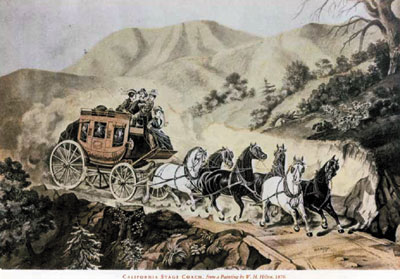As the race for the White House winds along to its big finish on
Nov. 4, let me tell you about a South Valley stagecoach driver
named Charlie Parkhurst who made American history simply by casting
a single vote in the presidential election held Nov. 4, 1868.
As the race for the White House winds along to its big finish on Nov. 4, let me tell you about a South Valley stagecoach driver named Charlie Parkhurst who made American history simply by casting a single vote in the presidential election held Nov. 4, 1868.
Most people have probably never heard of Parkhurst, who went by the name of “One-Eyed Charlie” and “Six-Horse Charlie” and was arguably the greatest “whip” in California during the days when people journeyed about by stagecoach. Parkhurst was born in 1812 in the village of Lebanon, N.H. and at an early age found work for Ebenezer Balch as a stable boy in Worcester, Mass. After that, the young orphan moved to Providence, R.I. and worked for the “What Cheer Stables” connected with the Franklin House Inn.
At the time of the California Gold Rush, James Birch and Frank Stevens started up the California Stage Company which consolidated several smaller stage lines that ran through the region. In 1851, Parkhurst moved out west and drove coaches for the two partners, gaining a reputation for macho manliness by wearing a heavy coat of buffalo hide and drinking, chewing tobacco and gambling as hard as any other whip. Unfortunately at one stop in Redwood City, a horse happened to kick Parkhurst in the head while being shoed. The accident caused the stagecoach driver to lose the use of one eye.
Parkhurst wore an eye-patch to hide the disfigurement. Despite the vision loss, the legendary whip continued to demonstrate an amazing skill driving coaches swiftly and safely through the most dangerous mountain roads – including over Mt. Madonna west of Gilroy and through the Pacheco Pass. The driver also demonstrated an astounding bravery in handling robbers and attacking Indians. This was despite the fact that Parkhurst stood only 5-feet 7-inches tall and talked with a rather raspy voice.
Later in life when arthritis started to inflict its cruel pain, California’s most famous stagecoach driver gave up the driving business (the last run was from San Juan Bautista to Santa Cruz) and tried various other trades including lumbering, cattle ranching, raising chickens on a farm in Aptos and running a stagecoach way station in Watsonville. Finally, cancer of the tongue caused by too many years of consuming chewing tobacco brought an end to old One-Eyed Charlie on Dec. 18, 1879.
Neighbors came to Parkhurst’s cabin located in the Santa Cruz Mountains to prepare the body for burial. When they pulled the clothes off, they discovered an astounding fact. The skilled stagecoach driver whom everyone had always thought was a man turned out to actually have been a woman. Her real name was Charlotte Darkey Parkhurst.
Even the stagecoach driver’s best friends were shocked by this gender revelation. When one of her close male buddies learned of the deception that had occurred for so many decades, he let out a string of cuss words. Parkhurst was buried in Pioneer Cemetery in the village of Freedom not far from Watsonville.
So what’s the connection with the amazing stagecoach driver and the presidential election of 1868? Well, it turns out that the name “Charles Darkey Parkhurst” is written on the official Santa Cruz County poll list of registered voters in that year’s election that resulted in Ulysses S. Grant getting into the White House. The state of Wyoming didn’t allow women to vote until 1869, becoming the first state in the union to do allow this right to females. Thus, Parkhurst is considered the first known woman to have voted in an election in the United States. In 1920, with the passage of the 19th amendment, American women in general would be given that right.
I wonder what Parkhurst might think about how far the nation has progressed in spreading the basic rights of democracy to the female population. Back in her time during the prime and proper age of the Victorians, voting was considered an undignified activity for women to engage in. “Ladies” should not be allowed in the dirty business of choosing leaders or deciding on issues, the Victorians believed. That was a gentleman’s occupation.
No doubt, many people of Victorian America would be shocked to find out our 21st century world considers it no big deal if a woman goes into the voting booth – or even dares to run for public office. I think Parkhurst would be proud of the progress. She knew first-hand that a woman can do “a man’s job” just as well – or even better – than a man. She knew that it’s not a person’s sexual category that matters in making a political decision. It’s what’s in a leader’s heart and head that really allows him or her to drive the stagecoach of democracy forward.










